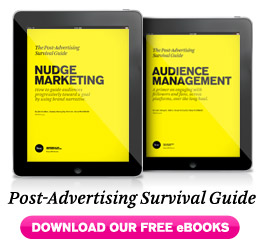 I have a bet with a friend who works in finance. He believes that Facebook will not exist in seven years. I, a marketer, couldn’t disagree more. It reminded me of when, in 1995, astronomer Clifford Stoll claimed that the Internet was “grossly overpromoted” and would ultimately be looked on as a fad. (He has since acknowledged his mistake.) More from Clifford later.
I have a bet with a friend who works in finance. He believes that Facebook will not exist in seven years. I, a marketer, couldn’t disagree more. It reminded me of when, in 1995, astronomer Clifford Stoll claimed that the Internet was “grossly overpromoted” and would ultimately be looked on as a fad. (He has since acknowledged his mistake.) More from Clifford later.
It’s difficult to define what “existence” even means in today’s digital age, when social technologies are imagined, developed, funded, adopted and acquired by a media conglomerate (often Facebook) in a matter of months, not years. Myspace is technically still in existence (I had to test it in my browser as I wrote this, just to be sure), but it’s far from relevant anymore in the social sphere. If Facebook goes the same route, I’ll concede defeat.
But I don’t expect to be in that situation come 2020. Though Wall Street is panicking about the stock price, which has shrunk by nearly half, Facebook is a game-changing technology, and technologies like that don’t just fade away in less than a decade. As we do the automobile, we can’t image what we ever did or would do without it. It’s a technology that we seemingly never saw coming (as opposed to a smartphone or tablet, which were arguably natural evolutions in product innovation), and technologies like that are special.
So if I’m so confident about the future of Facebook, where do I think it’s going? What do I think it will look like in seven to 10 years? As technology is moving so quickly, it would be futile for me to speculate on exactly what Facebook may be at that time, but here are four that opportunities could help sustain the platform.
*Note: This was the lead article in our September email newsletter. You are welcome to share it (thank you!), but newsletter articles aren’t published publicly to the blog until 5 days after the newsletter is sent. So sign up now to be the first to get articles like this direct to your inbox.
1. Mobile
 Our own Jim Boulton forecast that in five years (four since he made the prediction), there wouldn’t be any more websites. At least not in the way we’ve historically seen them exist (static and brochure-like) for the past decade and a half. The most fruitful opportunity for the future Facebook is embracing the idea of mobility—building amazing products specifically for mobile devices.
Our own Jim Boulton forecast that in five years (four since he made the prediction), there wouldn’t be any more websites. At least not in the way we’ve historically seen them exist (static and brochure-like) for the past decade and a half. The most fruitful opportunity for the future Facebook is embracing the idea of mobility—building amazing products specifically for mobile devices.
With each passing year, we become ever more connected to the web (and, consequently, each other), yet the devices are becoming ever less connected to our desktops (the ones with four legs). Tablets and smartphones can handle nearly all our connectivity needs and are progressing rapidly toward handling our content-creation needs.
It’s very possible that future of Facebook is as a mobile entity, complete with mobile advertising and other monetizing strategies, with us wherever we go, as opposed to just a destination we visit. AdAge reports that Facebook’s mobile-ad machine is expected to gain steam, growing more than 500 percent in 2013, to $387 million. By 2014 it should be the second-largest seller of mobile advertising, after Google.
According to CEO Mark Zuckerberg, Facebook is already a mobile company. Regardless of what our communication devices will look like in 2020, I believe that Facebook will (still) be part of it.
2. Search
According to TechCrunch, investors are salivating over the prospect of Facebook getting into the search game (Faceboogle? GooBook?). Facebook gets a billion searches a day “without even trying,” Zuckerberg said, and it’s a good move. Facebook knows far more about our personal lives than any search engine could. There are privacy issues galore, but just imagine the possibilities. Instead of searching Google or Yelp for a good restaurant in town, you could use Facebook’s search utility and find which restaurants your friends have checked into, what they said about them and the pictures they took there (and I’m sure that if they have Instagram, it’s pictures of their food). One author at Social Fresh even thinks that Google should legitimately be worried.
Using search is another way to monetize, by possibly helping curb the intrusion of ads into our timelines. Facebook already inserts sponsored results into searches; these results are reported to have a higher click-through rate and a lower cost-per-click than display ads. InsideFacebook for the find.) Don’t be surprised to find Facebook head-to-head with Google in the next few years.
3. Currency/Payments
Probably the most intriguing possibility (at least to me) is the proposition of Facebook payments, in both their own currency and real currency.
Right now the thousands of apps and games on Facebook can generate revenue through Facebook Payments. Whether it’s a BFF locket, Agar Bucks or a new shovel in FarmVille, you can use real dollars to buy not-real stuff online, with Facebook taking a cut. The overall marketing for virtual goods in the United States was predicted to be heading to $2.9 billion for 2012, according to the Inside Virtual Goods report.
Also, since Facebook has become the social hub for most of its users (is there any other place on the web that has as much information?) and has begun to be our standard log-in for connecting to third-party sites via Facebook Connect, it could become our online wallet; PayPal has tried to achieve this but has yet to become ubiquitous. We spend so much time on Facebook; why should we even have to leave the platform to buy things? And if we do leave the platform, why can’t we just use our Facebook log-in to buy items with a single click? Even if only a quarter of Facebook’s user base, which is quickly approaching one billion, is comfortable enough to link its credit cards to Facebook, that’s roughly 250 million, more than double the user base of PayPal. This is a major opportunity and one that some analysts believe is Facebook’s best option for a sustainable future.
4. Advertising and The User Base
The elephant in the room is advertising, as well as all the possibilities that revolve around leveraging Facebook’s user base. Between the near billion users, the amount of information each user provides and the ever-expanding criteria for ad targeting, Facebook has provided advertisers with the most comprehensive social graph ever. “There has never been any single company or organization, with the exception of possibly the U.S. or Chinese government, who have been able to map the relationships of people around the globe to the extent Facebook has been able to do,” said Reuven Cohen in his great piece “Mining the Human Cloud” on Forbes.
Facebook’s advertising model has major faults, and should it wholly embrace advertising in the way that Myspace did (full-page takeovers and such), I’m losing the aforementioned bet. What we know about Mark Zuckerberg and his company’s mission, however, is that Facebook’s products come first. I find it very hard to believe that it would ever mortgage its future by going all-in on advertising. The previous three scenarios, or more likely a combination of all three plus new opportunities we haven’t even imagined yet, will define the future of Facebook.
The Role of Brands
I don’t want to forget the major role brands play on Facebook. Or, conversely, the major role Facebook plays in brands’ efforts to market content and engage audiences. Currently brand pages are free, but Facebook seems to be quite aware that it costs money to build and support them. The idea, as highlighted in this Business Insider article by Jim Edwards, is to get brands addicted to Facebook in the hope that they will utilize promoted posts, paid ads and sponsored stories to help expand their reach. “The company can’t reach all its fans without spending money to promote posts,” Edwards said, “and it can’t ratchet down its always-on Facebook spend, because it has a large fan base who expect it to be there when there’s a problem.” Now it has a customer for life.
Who Am I To Predict the Future?
I am no futurist. I don’t own any stocks, and I’m not even sure which players I should start on my fantasy football team this week. To put the previously disparaged Clifford Stoll in a positive light, he gave an enlightening (yet frantic) TED talk in which he made a great point about the ability of technologists (and marketers and financial analysts, I believe) to predict the future:
If you really want to know about the future, don’t ask a technologist, a scientist, a physicist. No! Don’t ask somebody who’s writing code. No, if you want to know what society’s going to be like in 20 years, ask a kindergarten teacher.”
What’s your prediction for the future of Facebook? In seven years, will Facebook still exist?



Pingback: Will Facebook Exist in 2020? | Marketing Content Watch